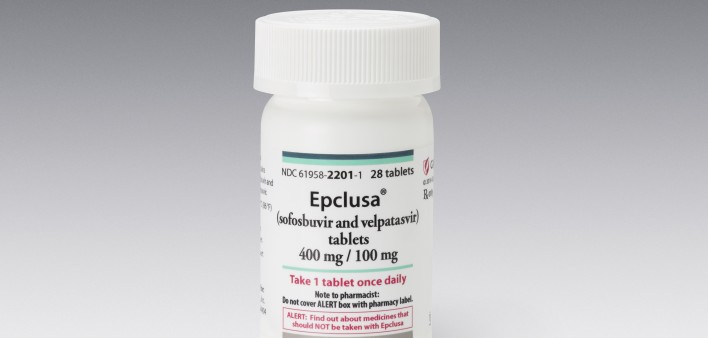The U.S. Food and Drug Administration (FDA) has approved Gilead Sciences’ fixed-dose, once-daily, pan-genotypic combination tablet regimen Epclusa (sofosbuvir/velpatasvir). Epclusa is the first approved tablet that treats all six major genotypes of the virus, and the green light from the FDA should assure that Gilead, which also manufactures the blockbuster drugs Harvoni (ledipasvir/sofosbuvir) and Sovaldi (sofosbuvir), maintains its status as the dominant player by far in the hep C market.
The approval indicates a 12-week regimen of Epclusa for those without cirrhosis or who have compensated cirrhosis (Child-Pugh A level of liver disease) and 12 weeks of Epclusa plus ribavirin for those with decompensated cirrhosis (Child-Pugh B or C).
Gilead has set the price of Epclusa at $74,760 for the 12-week regimen, just below the price of AbbVie’s Technivie (ombitasvir/paritaprevir/ritonavir), which retails for $76,653, and considerably below Harvoni’s $94,500 price tag. Harvoni often costs less than that figure, thanks to exclusive agreements Gilead arranges with pharmacy benefit managers. Also, many people with genotype 1 of hep C can take Harvoni for just eight weeks, which reduces its cost to $63,000.
The FDA had granted Epclusa a priority review and breakthrough therapy designation, given to investigational treatments that offer significant advantages over existing ones.
The approval was based on data from four international Phase III studies, ASTRAL-1, -2, -3 and -4.
The first three trials included 1,035 people with genotypes 1 through 6 of hep C who did not have cirrhosis or who had compensated cirrhosis; they were treated for 12 weeks with Epclusa. A total of 1,015 of them (98 percent) achieved a sustained virologic response 12 weeks after completing therapy (SVR12, considered a cure), giving the treatment a similar cure rate to those seen in Phase III trials of Harvoni.
In the ASTRAL-4 trial, 267 people with genotypes 1 through 6 who had decompensated cirrhosis (Child-Pugh B) were randomized to receive 12 weeks of Epclusa with or without ribavirin or to receive 24 weeks of Epclusa. Among those who took Epclusa and ribavirin for 12 weeks, 94 percent were cured. A respective 83 percent and 86 percent of those treated with just Epclusa for 12 weeks and 24 weeks were cured.
The most common side effects in the first three ASTRAL trials, occurring in 10 percent or more of participants, were headache and fatigue. These health issues occurred at a similar or higher frequency compared with individuals who received a placebo. Among 87 people with decompensated cirrhosis who took ribavirin in ASTRAL-4, fatigue, anemia, nausea, headache, insomnia and diarrhea were the most common side effects, occurring in at least 10 percent of participants. Two people who took just Epclusa and four who also took ribavirin stopped treatment due to adverse health events.
Epclusa comes with a warning of a serious potential side effect, bradycardia, or low heart rate, for those taking the heart medication Cordarone (amiodarone), in particular for those also taking beta-blockers or who have underlying cardiovascular disease or advanced liver disease.
To read a press release on the approval, click here.







1 Comment
1 Comment